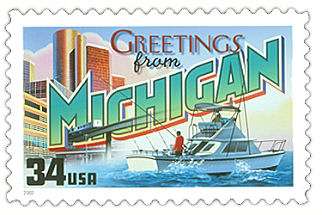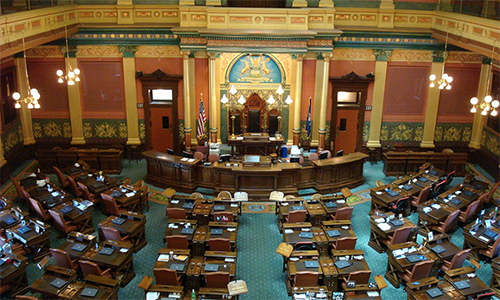Michigan State Senate Committee Holds Online Poker Regulatory Hearing
The Michigan State Senate’s Regulatory Reform Committee conducted an informational hearing regarding online poker on Wednesday, the first step to possible regulation of the pastime in the state. The Michigan hearing was conducted in conjunction with a measure introduced last month, Senate Bill 0889, which may or may not have a realistic chance of legislative movement in the near future yet opens, at the very least, a ne lobbying opportunity.
Today’s hearing in Lansing created an opportunity for several prominent industry officials to testify before the Regulatory Reform Committee, offering information on how regulated online poker protects consumers while also capturing a new revenue stream for government. According to poker writer Steve Ruddock, who attended the hearing, witnesses on hand included PPA Executive Director John Pappas, Michael Pollock, the managing director of Spectrum Gaming Group, and three separate, prominent operational executives from Canada’s Amaya, Inc., the parent company of industry-leader PokerStars.
 Representing Amaya were Jeanne David, Amaya’s Responsible Gaming Manager, Steven Winter, Amaya’s Director of Operations, and Matthew Robins, Amaya’s Director of Compliance. Each of the three was invited to the hearing to provide detailed testimony designed to refute some of the concerns often raised by anti-gambling types that target the ill-informed. David and Robins, for example, detailed some of Amaya’s “Know Your Customer” customer-ID and geolocation security measures, guards against money laundering, and protections against underage or problem-gambler play.
Representing Amaya were Jeanne David, Amaya’s Responsible Gaming Manager, Steven Winter, Amaya’s Director of Operations, and Matthew Robins, Amaya’s Director of Compliance. Each of the three was invited to the hearing to provide detailed testimony designed to refute some of the concerns often raised by anti-gambling types that target the ill-informed. David and Robins, for example, detailed some of Amaya’s “Know Your Customer” customer-ID and geolocation security measures, guards against money laundering, and protections against underage or problem-gambler play.
The presence of the various pro-poker officials showed the background effort put in by SB 0899’s primary sponsor, State Senator Mike Kowall (R), a member of the Regulatory Reform Committee. SB 0899 was filed with four initial co-sponsors, Senators Curtis Hertel Jr., Rebekah Warren, Bert Johnson and Marty Knollenberg. All four are also members of the nine-person Regulatory Reform Committee before which today’s hearing was conducted, offering solid prospects for SB 0899 (and a companion technical bill, SB 0900, which would make specific changes regarding online gambling to Michigan’s existing criminal code). However, the state of Michigan faces several important, immediate issues, making an online-poker bill a somewhat low priority.
As for providing the overview supporting the measure, that was left to the PPA’s Pappas, who was the day’s initial speaker. Pappas’s testimony was designed to not only upsell the proposed bill as a vital piece of consumer-protection legislation, but to dispel some of the myths and falsehoods regarding online gambling that are sure to be launched at the bill, if and when it gathers serious legislative traction.
“S.B. 889 should not be viewed as an expansion of gambling in Michigan,” Pappas told the committee, but rather as an opportunity to protect consumers and add a new distribution channel for the state’s existing, and tightly regulated, gaming industry. To be clear, citizens of this state have access to online poker, online casino games and online sports betting – but they play on foreign sites, none of which are properly licensed or regulated by this government.”
Pappas then went on to describe one of the most recent scandal-ridden episodes in the “grey market” of online poker, the 2013-15 slow-motion failure of Lock Poker. “This void in consumer protection,” said Pappas, “is all too real for Michigan residents who played on Lock Poker, an online site based in Curacao, which abruptly shut down in April 2015, and took millions in player deposits. Sadly, because of zero regulatory oversight, there’s nothing affected customers can do to get their money back and to hold this rogue website accountable. S.B. 889 changes this dynamic and puts Michigan in control of internet gaming by corralling the unregulated market and turning it into a state-based industry that is safe for consumers and accountable to regulators.”
Pappas then flipped his approach, highlighting the benefits of forward thinking by Michigan’s elected officials. “More and more, Americans are turning to the internet for nearly all forms of recreation and activity. For example, banking is done mostly all online today, we can buy a car online and we even date online. Moving a poker game from the kitchen table to the computer table is just another part of the way the internet has transformed our lives. Extending oversight into internet gaming is simply a reflection of our modern-day society. Michigan can choose to ignore the internet, or it can embrace it for the benefit of its citizens and regulate it to protect them. We should remember that authorized internet gaming is not new to this state. For many years, Michigan horse bettors have been able to wager through the internet. The state has also – successfully and safely – begun offering lottery products for purchase through the internet.”
The gathered committee members appeared generally receptive to the experts’ testimony, though no official vote on SB 0899 has even been scheduled, much less taken. A handful of concerns were brought up by the attending committee members, including language in SB 0899 that would allow interstate play, or a call within the bill for the state’s tribal nations to voluntarily surrender claims of sovereignty when serving off-reservation players. We’ll look at some of the details with SB 0899 in a near-future breakdown of the bill.


















COMMENTS